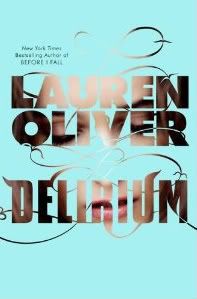February 2011
Set in a not-too-distant future, Lena Holoway can't wait until the operation that will remove any possibility of being infected by the disease amor deliria nervosa. Lena is fairly unique amongst her peers in that she's always tried to suppress her emotions, feeling incredible shame after her mother, immune to the operation and hopelessly emotional, abandoned her and left her in the care of her aunt, a disapproving and fussy woman. Lena completely buys all the propaganda that experiencing falling in love will only cause heartache in the end. Her older sister also proved an embarrassment by falling in love and provoking an emotional display when it came her turn for the operation. Lena secretly worries that because of her family history she may be more susceptible to hysteria and loss of reason than most. There are little hints and clues that all is not as tranquil as one might guess, however. The fact that Lena's best friend Hana also expresses her doubts about the operation, and that Lena stumbles upon an active, forbidden nightlife scene is a sure sign that she's not as aberrant as she thinks. Even the state-approved fiance chosen for her privately confesses that before his operation, he had stirrings of feelings for a girl down the street. Chillingly, all gays and lesbians are "cured" of their feelings as well, and matched with opposite sex partners.
The book has a very strong sense of place. If you're going to set a novel in a dystopian, carless future, Portland, Maine is the perfect locale. Situated on a peninsula of the rocky southern Maine coast, it's a very compact, walkable, beautiful oceanside city full of notable landmarks. I attended college in Portland, Maine for a few years, and it was really fun to recognize all of the street names and landmarks that Oliver uses. Munjoy Hill, Back Cove, The Eastern Promenade, Old Port, Congress St., Fore St., Deering Oaks Park. I wondered why Longfellow Square was so conspicuously absent... until it's revealed much later in the story, that in this world, poetry has been banned.
When Lena bombs the personality test administered to all young adults, she gets a rare second chance... the facility was victim of a prank by protestors who let loose a herd of cattle into the auditorium, invalidating her results. She also rather fatefully meets a mysterious young man, Alex, who turns out to be an undercover operative from the resistance. He hasn't undergone "the cure" and is able to show her that maybe falling in love isn't such a bad thing after all. The two of them enjoy several steamy make-out sessions, made all the more enticing by their forbidden allure, as Lena struggles to decide what she will do. The two of them leave messages for each other, hidden in a statue on Monument Square. I must confess I found this portion incredibly distracting, as I couldn't match the description to any particular statue that I remembered. Oliver describes the statue as:
I had a few questions about how things came to be in their current state. Did a group of heartbroken people initially agree to have the operation and then impose the cure by force on others? In a world where all of the adults have rendered themselves emotionally flat, would that lend an even stronger intensity to childhood friendships? Portland is kind of a far-flung city - where's the center of government? Who's benefitting from all of this? Do people work harder and more productively when they don't love their families? There's plenty of thought devoted to the excitement and rush of young love, and parental love is also mentioned in the book. What about long-term affection? Sure, love can be painful at times, but on the balance, life is pretty empty without it. I was surprised that more people weren't actively fighting back. I also wanted to throttle Lena at times, as she deliberately put her head in the sand for a good portion of the book, and took a long time to slowly and carefully make her decisions, but given her background, perhaps it was understandable. This was an amazing book, one that lived up to my every expectation. A thrilling, romantic journey with a riveting conclusion, I highly recommend it.
I received a free copy of this book from the publisher.
Set in a not-too-distant future, Lena Holoway can't wait until the operation that will remove any possibility of being infected by the disease amor deliria nervosa. Lena is fairly unique amongst her peers in that she's always tried to suppress her emotions, feeling incredible shame after her mother, immune to the operation and hopelessly emotional, abandoned her and left her in the care of her aunt, a disapproving and fussy woman. Lena completely buys all the propaganda that experiencing falling in love will only cause heartache in the end. Her older sister also proved an embarrassment by falling in love and provoking an emotional display when it came her turn for the operation. Lena secretly worries that because of her family history she may be more susceptible to hysteria and loss of reason than most. There are little hints and clues that all is not as tranquil as one might guess, however. The fact that Lena's best friend Hana also expresses her doubts about the operation, and that Lena stumbles upon an active, forbidden nightlife scene is a sure sign that she's not as aberrant as she thinks. Even the state-approved fiance chosen for her privately confesses that before his operation, he had stirrings of feelings for a girl down the street. Chillingly, all gays and lesbians are "cured" of their feelings as well, and matched with opposite sex partners.
The book has a very strong sense of place. If you're going to set a novel in a dystopian, carless future, Portland, Maine is the perfect locale. Situated on a peninsula of the rocky southern Maine coast, it's a very compact, walkable, beautiful oceanside city full of notable landmarks. I attended college in Portland, Maine for a few years, and it was really fun to recognize all of the street names and landmarks that Oliver uses. Munjoy Hill, Back Cove, The Eastern Promenade, Old Port, Congress St., Fore St., Deering Oaks Park. I wondered why Longfellow Square was so conspicuously absent... until it's revealed much later in the story, that in this world, poetry has been banned.
When Lena bombs the personality test administered to all young adults, she gets a rare second chance... the facility was victim of a prank by protestors who let loose a herd of cattle into the auditorium, invalidating her results. She also rather fatefully meets a mysterious young man, Alex, who turns out to be an undercover operative from the resistance. He hasn't undergone "the cure" and is able to show her that maybe falling in love isn't such a bad thing after all. The two of them enjoy several steamy make-out sessions, made all the more enticing by their forbidden allure, as Lena struggles to decide what she will do. The two of them leave messages for each other, hidden in a statue on Monument Square. I must confess I found this portion incredibly distracting, as I couldn't match the description to any particular statue that I remembered. Oliver describes the statue as:
...Striding forward, one hand holding his hat on his head so that it looks like he is walking through a horrible storm, or a headwind. His other fist is extended in front of him. It's obvious that he was, in the distant past, holding something - probably a torch - but at some point that portion of the statue was broken or stolen. So now the Governor strides forward with an empty fist, a circular hole cut in his hand, a perfect hiding place for notes and secret stuff.Despite the above description, whenever the Governor was mentioned, I pictured this statue instead, the Maine Lobsterman, about half a block south of Monument Square.
I had a few questions about how things came to be in their current state. Did a group of heartbroken people initially agree to have the operation and then impose the cure by force on others? In a world where all of the adults have rendered themselves emotionally flat, would that lend an even stronger intensity to childhood friendships? Portland is kind of a far-flung city - where's the center of government? Who's benefitting from all of this? Do people work harder and more productively when they don't love their families? There's plenty of thought devoted to the excitement and rush of young love, and parental love is also mentioned in the book. What about long-term affection? Sure, love can be painful at times, but on the balance, life is pretty empty without it. I was surprised that more people weren't actively fighting back. I also wanted to throttle Lena at times, as she deliberately put her head in the sand for a good portion of the book, and took a long time to slowly and carefully make her decisions, but given her background, perhaps it was understandable. This was an amazing book, one that lived up to my every expectation. A thrilling, romantic journey with a riveting conclusion, I highly recommend it.
I received a free copy of this book from the publisher.


Excellent Madigan!
ReplyDeleteThis book sounds like it could be compared to The Uglies. Instead of having everyone look the same - super model clones - everyone has the emotional depth of rocks.
I like how this doesn't seem to be too fast paced - it sounds like a slow plot builder from your review - and I like how there is resistance from people fighting to be as they are. My favorite thing you mentioned was how you took your own spin on this review from your own experiences of living in Maine.
Great job!
~Kelsa
I just reviewed this book as well! Although, I forget there are other Portlands besides the one in Oregon, so at first it was a bit confusing for me to read as I was picturing Portland Oregon. I agree with you, it was a good book.
ReplyDeleteGreat review!
ReplyDeleteThis one was good, but I would have liked a little background information on how things came to be that way in society too.
I loved the ending! Up until then I found the pace of the book a little slow for my tastes, but the ending was WOW!!
@Lisa - I knew a lot of people would be thinking of the more famous Portland, Oregon... I don't think Oliver made it overwhelmingly clear at first that she's talking about the one in Maine.
ReplyDelete@Leanna - The ending had me banging my head against a wall, but it was unforgettable, you can't argue that!
I really enjoyed Before I Fall, and I find it interesting that Oliver switched genres so quickly after publishing her debut novel. Usually, it seems like authors stick to the same genre for awhile. I've heard a lot of great things about Delirium though, so I can't wait to read it!
ReplyDeleteI think it's smart to switch it up right away, if you want to. Otherwise, if you write a trilogy all in one style, and then want to try something different, you run the risk of alienating the fan base that you just worked so hard to build up.
ReplyDelete